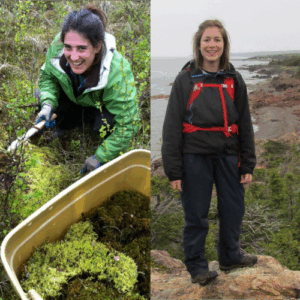2023 National Winter Webinar Series
The National Invasive Species Winter Webinar series is here!
Kicking off during February’s Invasive Species Awareness Week #ISAW (February 20-24), CCIS is working closely with partners to deliver a range of speakers that will highlight projects and research helping to promote awareness and tackle emerging invasive species issues across Canada. Webinars will be held on Wednesday’s from 1-2pm Eastern Standard Time and will include invasive species topics related to communication, climate change, aquatic ecosystems, and more! Stay tuned as we announce new topics and speakers.
You can support our work including our winter webinar series to spread the word about invasive species; eliminate the pathways invasive species use to spread in Canada; and protect our ecosystems by making a donation.
Access previous webinar recordings
Subscribe for webinar recording updates
Webinar 1: “Think Like A Psychologist: How to better communicate about invasive species to your audience”
Wednesday, February 22, 2023 @ 1:00 pm EST
Meet the Speaker: Ken Donnelly, Beyond Attitude Consulting
Ken Donnelly has been working on sustainability issues for over 30 years. He specializes in applying psychology to communications and outreach campaigns. For the past 12 years, Ken has focused on invasive species, biodiversity and climate change. Ken is a Director of the Canadian Council on Invasive Species and a co-chair of the Nova Scotia Invasive Species Council. At home in Halifax, Ken is also the President of a local charity and a Board member of a Protected Wilderness Area.
Registration closed, stay tuned for the recording!
Webinar 2: “Mitigating Treaty #3 Invasive Species Impacts Through Early Detection Monitoring”
Wednesday, March 1, 2023 @ 1:00 pm EST
Meet the Speaker: Chris Herc, Territorial Planning Unit, Grand Council Treaty #3
 Chris Herc is Grand Council Treaty #3’s Environmental Specialist. Through his works at Grand Council Chris leads the Guardians and Community Based Monitoring initiatives to build and elevate capacity for Indigenous led stewardship and protection of the lands and waters in Treaty #3. Through these initiatives Chris leads capacity building workshops and field monitoring with communities for species at risk, surface water quality, and invasive species. Chris has a B.Sc. in Environmental and Natural Resources with over ten years’ experience and has worked across Canada in the field of wildlife conservation before settling into his role at the Grand Council. He is always excited to work with the Treaty #3 communities and build new environmental monitoring initiatives and partnerships for the Nation.
Chris Herc is Grand Council Treaty #3’s Environmental Specialist. Through his works at Grand Council Chris leads the Guardians and Community Based Monitoring initiatives to build and elevate capacity for Indigenous led stewardship and protection of the lands and waters in Treaty #3. Through these initiatives Chris leads capacity building workshops and field monitoring with communities for species at risk, surface water quality, and invasive species. Chris has a B.Sc. in Environmental and Natural Resources with over ten years’ experience and has worked across Canada in the field of wildlife conservation before settling into his role at the Grand Council. He is always excited to work with the Treaty #3 communities and build new environmental monitoring initiatives and partnerships for the Nation.
Registration closed, stay tuned for the recording!
Webinar 3: “Wild Pigs – A One Health Threat”
Wednesday, March 8, 2023 @ 1:00 pm EST
Meet the Speaker: Dr. Wayne Lees, Squeal on Pigs Manitoba
Wild pigs are capable of harbouring a multitude of diseases, including foreign animal diseases, multi-species diseases and zoonotic diseases. The increased prevalence of African Swine Fever around the world has highlighted wild pigs as a significant risk to effective disease prevention and control. This invasive species has other significant impacts on crops and pastures, ecosystem health and public safety – making wild pigs an ecological train wreck. In Manitoba we have taken an aggressive approach to controlling (and eventually eliminating) wild pigs by implementing lessons learned from other jurisdictions and adapting techniques to work in a cold winter environment.
Dr. Wayne Lees is a 1975 graduate of Western College of Veterinary Medicine and holds a Master’s degree in veterinary epidemiology from the Ontario Veterinary College. In 2014 he retired as Chief Veterinary Officer for the Province of Manitoba after holding previous positions in the federal government, in international development, in private practice and in academia. For the past year he has been coordinator of the Manitoba Invasive Swine Eradication Project, an initiative to control and eventually eliminate wild pigs from the province.
Registration closed, stay tuned for the recording!
Webinar 4: “Functional Eradication as a Framework for Invasive Species Control”
Wednesday, March 15, 2023 @ 1:00 pm EST
Meet the Speaker: Dr. Stephanie Green, University of Alberta
Most aquatic invasive species managers in the US and Canada indicate that priority invasions within their jurisdictions have spread beyond the scale at which eradication is feasible. Yet most programs also lack quantitative targets focused on alternate strategies such as containment and suppression. In this talk I will outline how ‘functional eradication’, a framework focused on suppression of invaders below population levels that result unacceptable ecological impacts, can be a viable option for managing the impacts of harmful, widespread AIS. I will highlight key ecological information needed to develop quantitative goals for functional eradication, and illustrate the application of this approach for several prolific invaders in freshwater and marine systems. Finally, I will share new research on the ecology and management of expanding aquatic invasive species in Canada—including the Northern Crayfish, Prussian carp and European green crab—and highlight how the approach could be used to limit their effects on recipient ecosystems. Ultimately, identifying realistic targets for suppression allows managers to estimate the removal required to mitigate ecological impacts, and the management resources needed to achieve these levels within high-priority management locations.
Dr. Stephanie Green is an Associate Professor and the Canada Research Chair in Aquatic Global Change Ecology and Conservation at the University of Alberta. Her lab investigates the causes and consequences of biodiversity change in marine and freshwater ecosystems. Dr. Green’s research uses field studies and experiments, quantitative models, and stakeholder surveys to understand how biological invasions impact natural resources. For the past 15 years, she has worked collaboratively with non-profit and government partners on the ecological effects and management of prolific aquatic invaders including Northern Crayfish and Prussian carp in central Canada, Indo-Pacific lionfish in the Western Atlantic Ocean, and European green crab on Canada’s Pacific coast.
Registration closed, stay tuned for the recording!
Webinar 5: “In the Weeds: A Municipality’s Approach to Integrated Pest Management through Managing Yellow Floating Heart”
Wednesday, March 22, 2023 @ 1:00 pm EST
Meet the Speakers: Emma Bocking (left) and Elizabeth Montgomery (right), Halifax Regional Municipality
 Halifax Regional Municipality is changing its approach to managing invasive species. In 2022, the municipality adopted its Integrated Pest Management Plan, which sets priorities for proactive management. Since 2009, residents living around Little Albro Lake in Dartmouth have been voicing their concerns about the abundance of invasive yellow floating heart in the lake. Currently, yellow floating heart is contained to this Little Albro Lake, where in summer it covers more than 50% of the surface. To prevent the further spread of the invasive pond weed, and pursuant to its Integrated Pest Management Plan, Halifax Regional Municipality (HRM) is pursuing eradication of yellow floating heart. This presentation will discuss our Integrated Pest Management Plan as a whole, and how it has been applied to manage yellow floating heart, and its current proposals for eradication. The presentation will also discuss key lessons learned from this ongoing process, and how HRM will apply these lessons to future management of other invasive species in the municipality.
Halifax Regional Municipality is changing its approach to managing invasive species. In 2022, the municipality adopted its Integrated Pest Management Plan, which sets priorities for proactive management. Since 2009, residents living around Little Albro Lake in Dartmouth have been voicing their concerns about the abundance of invasive yellow floating heart in the lake. Currently, yellow floating heart is contained to this Little Albro Lake, where in summer it covers more than 50% of the surface. To prevent the further spread of the invasive pond weed, and pursuant to its Integrated Pest Management Plan, Halifax Regional Municipality (HRM) is pursuing eradication of yellow floating heart. This presentation will discuss our Integrated Pest Management Plan as a whole, and how it has been applied to manage yellow floating heart, and its current proposals for eradication. The presentation will also discuss key lessons learned from this ongoing process, and how HRM will apply these lessons to future management of other invasive species in the municipality.
Emma Bocking is the Environment Specialist at Halifax Regional Municipality, focusing on wetlands, policy development, terrestrial ecology, natural asset management and wildlife connectivity. Prior to working at HRM, Emma worked in the non-profit sector and has a background in wetland conservation and environmental education.
Elizabeth Montgomery is the Water Resources Specialist at Halifax Regional Municipality, focusing on water and aquatic ecosystem issues, policy development, and fresh water quality. Before joining the Environment & Climate Change team at HRM, Elizabeth worked as a water supply plant operator, and doing ecological and coastline restoration.
Registration closed, stay tuned for the recording!
Webinar 6: “Don’t Let it Loose”
Wednesday, March 29, 2023 @ 1:00 pm EST
In this webinar you will hear presentations about commonly released invasive species from the pet and aquarium trade and their impacts on our landscapes and waters. Learn more about our feature speaker, Brian Heise and his presentation below.
Meet Our Feature Speaker: Brian Heise, Department of Natural Resource Sciences at Thompson Rivers University
“Trouble outside the tank: negative impacts and control of invasive goldfish in BC”
 The goldfish, Carassius auratus, is one of the most popular aquarium fishes in the world, but can damage BC lakes and rivers due to its competition with native fishes for food, its predation on the eggs and larvae of amphibians, its uprooting and consumption of aquatic plants, and the parasites it could spread to native salmonids. To control goldfish BC should consider the use of boat electrofishing in the spring, and stronger policies regarding pet industry practices surrounding the release vs. return of pet fishes.
The goldfish, Carassius auratus, is one of the most popular aquarium fishes in the world, but can damage BC lakes and rivers due to its competition with native fishes for food, its predation on the eggs and larvae of amphibians, its uprooting and consumption of aquatic plants, and the parasites it could spread to native salmonids. To control goldfish BC should consider the use of boat electrofishing in the spring, and stronger policies regarding pet industry practices surrounding the release vs. return of pet fishes.
Brian Heise is a faculty member in the Department of Natural Resource Sciences at Thompson Rivers University, in Kamloops BC., where he teaches courses in ichthyology, fisheries management, limnology, and ecosystem reclamation. His research looks at the effects of various land use practices on freshwater ecosystems, with an emphasis on aquatic invertebrates and invasive fishes. He and his students are currently looking at the ecology and innovative control methods for invasive smallmouth bass and goldfish. Brian is also a former Chair of the Invasive Species Council of BC.
Registration closed, stay tuned for the recording!



